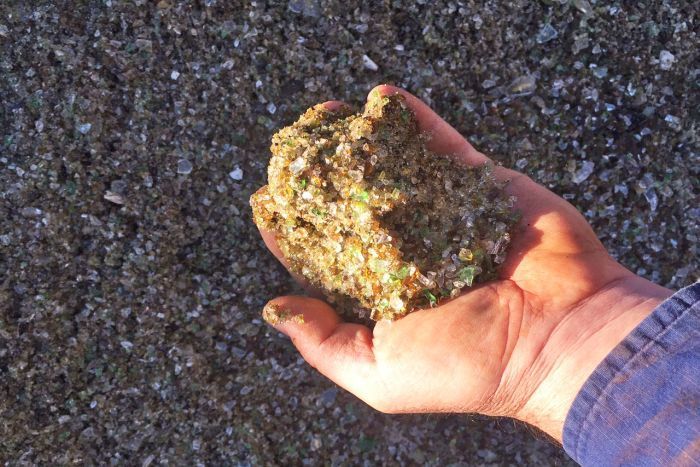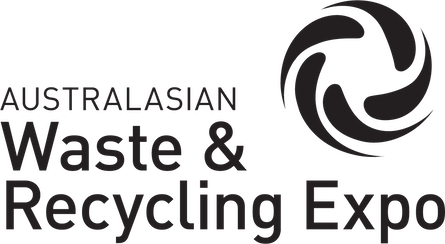Progressive councils find new ways to tackle waste management

Crushed glass becomes a sand-like substance used as a construction material. Photo by Lismore City Council
Progressive councils across Australia were already pushing the boundaries on managing municipal waste even before the China import ban, and since then several exciting new initiatives have been announced.
Earlier this year, China stopped importing much of the recyclable waste generated by Australia as part of a drive to better deal with its own growing waste issues.
The crisis this has caused in Australian recycling may in fact be precisely the opportunity we need to reboot the way we handle waste, says Pete Shmigel, CEO of the Australian Council of Recycling.
“We shouldn’t resent the Chinese for what they’ve done – we should emulate them,’’ says Shmigel.
Progressive councils across Australia were already pushing the boundaries on managing municipal waste even before the Chinese decision, and since then several exciting new initiatives have been announced.
Plastic roads
The Gold Coast City Council is considering making road surfaces out of recycled plastics.
The technology transforms household and commercial waste into pellets which can replace much of the bitumen in the asphalt mix used to surface roads.
The plastic pellets bonds well with the tar as they are both petroleum products, and the resulting blend reduces landfill use as well as the consumption of fossil fuels
British manufacturers claim the plastic road surface can bear a higher load than regular asphalt, reducing potholes and increasing road life.
The Gold Coast council is also looking into using recycled tyres to help bulk up the road surface.
Gold Coast already has a great track record in using waste for road projects. In 2016, it won a prestigious industry award for its innovative program to recycle asphalt from old roads into new road surfaces.
Glass sand
While mountains of unwanted glass are rising across Australia, the NSW city of Lismore can’t get enough of it, even importing it from neighbouring shires.
It crushes about 6000 tonnes of discarded glass every year into a sand-like construction material. The sand is used by council to build road bases, for backfill material and as bedding for water pipes. It is also being trialed in blends with concrete and other materials.
The glass processing plant is situated at the Lismore Materials Recovery Facility, which processes 15,000 tonnes of recyclables annually. The council decided to build its own facility after previously sending the region’s recyclables across the state border to Queensland.
Last year, Lismore won the Civil Contractors Federation NSW Earth Award in June for its use of the crushed glass sand as backfill material in the construction of a sewage pump station.
Lismore City Council is a waste processing leader in other ways too. It recently installed an optical sorter at the Recovery Facility which allows it to sort and separate the two main plastic streams – PET and HDPE – making it is easier to find a market for them than it would be otherwise.
Flexible packaging
Residents of Brimbank, in Melbourne’s west, will soon be able to recycle more and waste less under a new council strategy that aims to expand the range of items to be recycled at the council’s Resource Recovery Centre in Keilor Park.
Brimbank City Council will negotiate with its sorting contractor to accept flexible plastics – the fastest-growing but least recycled form of packaging in Australia – as a recyclable product. This follows a successful trial by the Victorian city of Darebin.
Brimbank also proposes to extend the range of products and materials accepted at the Resource Recovery Centre to include bicycles, plastics, electrical appliances, cardboard and clothing.
The council’s innovative approach to waste management also incorporates a drive to better educate the community on waste reduction and on illegal dumping, which costs ratepayers hundreds of thousands of dollars a year in clean-ups.
Brimbank’s draft strategy has been put to the community for feedback.
Waste to energy
An average household’s wheelie bin contains enough waste to produce up to 20 percent of its weekly power needs. Now several councils, including in Western Australia are tapping into this power source while reducing landfill.
A state-of-the-art waste-to-energy facility currently under construction in the City of Kwinana, a local government area in Perth’s south, has signed agreements with eight local governments to supply up to 400,000 tonnes of residential (post-recycling) waste a year. Once complete in 2020, the facility will supply over 30MW of power back into the local electricity grid.
With such innovative local governments tackling refuse management head on, Australia is well placed to meet the challenges of cleaning up its own waste.
-
Subscribe to the latest industry news, insights and AWRE updates.
- Subscribe
